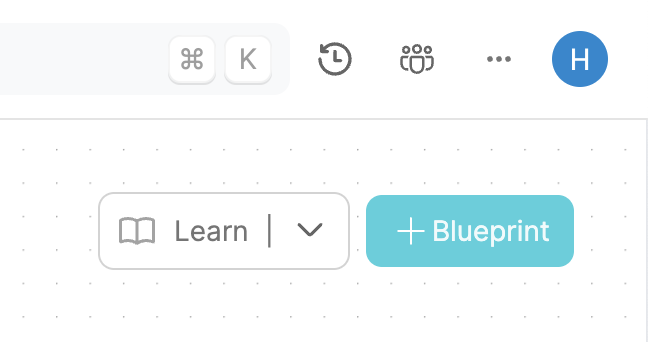Setup Blueprints
Blueprints are the most basic building block in Port. They are used to represent assets in your organization, and the relationships between them.
Blueprints are comprised of properties, which are used to define the structure of the data they represent. Port supports a wide variety of property types, allowing you to model your data in the most accurate way possible.
Blueprints are completely customizable, and support any number of properties. They are created and managed in the builder page of the portal.
Common blueprints
Blueprints can be used to represent any asset in your software catalog, some common examples are:
- Microservices
- Packages
- Package versions
- CI jobs
- K8s Clusters
- Cloud accounts
- Cloud environments
- Developer environments
- Service deployment
- Pods
- VMs
Check out our live demo to see an example of a fleshed-out builder with a variety of blueprints.
Configure blueprints in Port
Port offers a variety of ways to create and edit blueprints:
- UI
- API
- Terraform
- Pulumi
{
"identifier": "myIdentifier",
"title": "My title",
"description": "My description",
"icon": "My icon",
"calculationProperties": {},
"schema": {
"properties": {},
"required": []
},
"relations": {}
}
Check out Port's API reference to learn more.
To edit an existing blueprint:
- Go to your Builder page.
- Expand your desired blueprint by double-clicking on it.
- Here you can add, remove, or edit this blueprint's properties and relations.
- To edit the blueprint's metadata (title, icon, etc.), click on the
...icon in the top right corner of the blueprint card, and chooseEdit blueprint.
To create a new blueprint:
- Go to your Builder page.
- Click on
+ Blueprintin the top right corner:

- Choose a name, icon, and description for your blueprint, then click
Create. - Your blueprint has been created, the next step is to ingest data into it.
resource "port_blueprint" "myBlueprint" {
title = "My blueprint"
icon = "My icon"
identifier = "myIdentifier"
description = "My description"
properties {
string_props = {
"myProperty" = {
type = "string"
title = "My Property"
}
"myUrlProperty" = {
title = "URL Property"
format = "url"
}
}
}
}
For a full example, check the Terraform-Managed Blueprint Example page.
- Python
- TypeScript
- JavaScript
- GO
"""A Python Pulumi program"""
impor t pulumi
from port_pulumi import Blueprint
blueprint = Blueprint(
"myBlueprint",
identifier="myBlueprint",
title="My Blueprint",
icon="My icon",
description="My description",
properties=port.BlueprintPropertiesArgs(
string_props={
"myStringProp": port.BlueprintPropertiesStringPropsArgs(
title="My string", required=False
),
"myUrlProp": port.BlueprintPropertiesStringPropsArgs(
title="My url", required=False, format="url"
),
"myEmailProp": port.BlueprintPropertiesStringPropsArgs(
title="My email", required=False, format="email"
),
"myUserProp": port.BlueprintPropertiesStringPropsArgs(
title="My user", required=False, format="user"
),
"myTeamProp": port.BlueprintPropertiesStringPropsArgs(
title="My team", required=False, format="team"
),
"myDatetimeProp": port.BlueprintPropertiesStringPropsArgs(
title="My datetime", required=False, format="date-time"
),
"myTimerProp": port.BlueprintPropertiesStringPropsArgs(
title="My timer", required=False, format="timer"
),
"myYAMLProp": port.BlueprintPropertiesStringPropsArgs(
title="My yaml", required=False, format="yaml"
),
}
)
)
import * as pulumi from "@pulumi/pulumi";
import * as port from "@port-labs/port";
export const blueprint = new port.Blueprint("myBlueprint", {
identifier: "myBlueprint",
title: "My Blueprint",
icon: "My icon",
description: "My description",
properties: [
{
identifier: "language",
title: "Language",
type: "string",
required: true,
},
],
});
"use strict";
const pulumi = require("@pulumi/pulumi");
const port = require("@port-labs/port");
const entity = new port.Blueprint("myBlueprint", {
title: "My Blueprint",
identifier: "myBlueprint",
icon: "My icon",
description: "My description",
properties: [
{
name: "language",
value: "Node",
},
],
});
exports.title = entity.title;
package main
import (
"github.com/port-labs/pulumi-port/sdk/go/port"
"github.com/pulumi/pulumi/sdk/v3/go/pulumi"
)
func main() {
pulumi.Run(func(ctx *pulumi.Context) error {
blueprint, err := port.NewBlueprint(ctx, "myBlueprint", &port.BlueprintArgs{
Identifier: pulumi.String("myBlueprint"),
Title: pulumi.String("My Blueprint"),
Icon: pulumi.String("My icon"),
Description: pulumi.String("My description"),
Properties: port.BlueprintPropertiesArgs{
StringProps: port.BlueprintPropertiesStringPropsMap{
"myStringProp": port.BlueprintPropertiesStringPropsArgs{
Title: pulumi.String("My string"),
Required: pulumi.Bool(false),
},
},
},
})
ctx.Export("blueprint", blueprint.Title)
if err != nil {
return err
}
return nil
})
}
For a full example, check the Pulumi-Managed Blueprint Example page.
Blueprint structure
Each blueprint is represented by a Json schema, as shown in the following section:
{
"identifier": "myIdentifier",
"title": "My title",
"description": "My description",
"icon": "My icon",
"calculationProperties": {},
"schema": {
"properties": {
"myProp1": {
"type": "my_type",
"title": "My title"
},
"myProp2": {
"type": "my_special_type",
"title": "My special title"
}
},
"required": []
},
"relations": {}
}
Structure table
| Field | Description | Notes |
|---|---|---|
identifier | Unique identifier | Required. The identifier is used for API calls, programmatic access and distinguishing between different blueprints |
title | Name | Required. Human-readable name for the blueprint |
description | Description | The value is visible as a tooltip to users when hovering over the info icon in the UI |
icon | Icon for the blueprint and entities of the blueprint. | See the full icon list below |
calculationProperties | Contains the properties defined using calculation properties | Required |
mirrorProperties | Contains the properties defined using mirror properties | |
schema | An object containing two nested fields: properties and required. | Required. See the schema structure here |
All available properties are listed in the properties page
Schema object
"schema": {
"properties": {},
"required": []
}
| Schema field | Description |
|---|---|
properties | See the properties section for more details. |
required | A list of the required properties, out of the properties object list. These are mandatory fields to fill in the UI form. |
Full icon list
Full icon list (click to expand)
API, Airflow, AmazonEKS, Ansible, ApiDoc, Aqua, Argo, ArgoRollouts, Aws, Azure, BitBucket, Bucket, Buddy, CPU, CPlusPlus, CSharp, Clickup, Cloud, Cluster, Codefresh, Confluence, Coralogix, Crossplane, Datadog, Day2Operation, DeployedAt, Deployment, DevopsTool, EC2, EU, Environment, Falcosidekick, Fluxcd, GKE, GPU, Git, GitLab, GitVersion, Github, GithubActions, Go, Google, GoogleCloud, GoogleCloudPlatform, GoogleComputeEngine, Grafana, Graphql, HashiCorp, Infinity, Istio, Jenkins, Jira, Kafka, Kiali, Kotlin, Lambda, Launchdarkly, Link, Lock, LucidCharts, Matlab, Microservice, MongoDb, Moon, NewRelic, Node, NodeJS, Notion, Okta, Package, Pearl, PostgreSQL, Prometheus, Pulumi, Python, R, React, RestApi, Ruby, S3, SDK, SQL, Scala, Sentry, Server, Service, Slack, Swagger, Swift, TS, Terraform, TwoUsers, Youtrack, Zipkin, checkmarx, css3, html5, java, js, kibana, logz, pagerduty, php, port, sonarqube, spinnaker